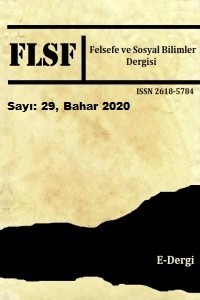Abstract
The swamping objection is one of the serious objections raised against reliabilism in recent years. This objection asserts that reliabilism cannot explain why knowledge is epistemically better than true belief given veritism — the view that truth is the sole fundamental epistemic value. Goldman and Olsson try to overcome this objection with their “conditional-probability” solution. Knowledge, according to Goldman and Olsson, is reliably produced true belief and the superior value of knowledge stems from the fact that this composite state increases the probability of future true beliefs of similar kind. The aim of this paper is to show that this reply is based on the “type-token” distinction and thereby faces the so-called “generality problem”. Therefore, for this reply to be successful, this difficulty needs to be resolved.
References
- Conee, Earl ve Feldman, Richard, “The Generality Problem for Reliabilism”, Philosophical Studies, sayı: 89, 1998, ss. 1-29.
- Depaul, Michael, “Value Monism in Epistemology”, Knowledge, Truth and Duty içinde, ed. Matthias Steup, Oxford University Press: Oxford, 2001.
- Feldman, Richard, “Reliability and Justification”, The Monist, sayı: 68, cilt: 2, 1985, ss. 159-174.
- Goldman, Alvin, Epistemology and Cognition, Harvard University Press: Cambridge, 1986.
- Goldman, Alvin & Olsson, Erik, “Reliabilism and the Value of Knowledge”, Epistemic Value içinde, eds. Adrian Haddock, Alan Millar ve Duncan Pritchard, Oxford University Press: Oxford, 2009.
- Jones, Ward, “Why Do We Value Knowledge?”, American Philosophical Quarterly, sayı: 34, 1997, ss. 423-40.
- Kvanvig, Jonathan, The Value of Knowledge and the Pursuit of Understanding, Cambridge University Press: Cambridge, 2003.
- Pritchard, Duncan, “Veritism and Epistemic Value”, Alvin Goldman and His Critics içinde, eds. Brian P. McLaughlin ve Hilary Kornblith, Blackwell: Oxford, 2016.
- Zagzebski, Linda, “The Search for the Source of the Epistemic Good”, Metaphilosophy, sayı: 34, 2003, ss. 12-28.
Abstract
Gölgeleme
itirazı, son dönemlerde güvenilirciliğe yöneltilen ciddi itirazlardan biridir.
Bu itiraz, güvenilirciliğin, veritizm yani doğruluğun tek temel epistemik değer
olduğu görüşü çerçevesinde, bilginin niçin doğru inançtan epistemik olarak daha
değerli olduğunu açıklayamayacağını öne sürer. Goldman ve Olsson, ortaya
koydukları “koşullu-olasılık çözümü” ile bu itirazın üstesinden gelmeye
çalışırlar. Bilgi, Goldman ve Olsson’a göre, güvenilir bir süreçle oluşturulmuş
doğru inanç olup, bilginin üstün değeri bu
bileşik yapının gelecekteki benzer türde inançların doğru olma olasılığını
arttırmasından kaynaklanmaktadır. Bu çalışmanın temel amacı, bu cevabın mevcut
itirazı bertaraf etmede başarısız olduğunu göstermektir. Söz konusu cevabın
başarılı olabilmesi, güvenilirciliğin karşılaştığı bir başka güçlük olan
“genellik sorunu” olarak adlandırılan meselenin çözümlenmiş olmasına bağlıdır.
References
- Conee, Earl ve Feldman, Richard, “The Generality Problem for Reliabilism”, Philosophical Studies, sayı: 89, 1998, ss. 1-29.
- Depaul, Michael, “Value Monism in Epistemology”, Knowledge, Truth and Duty içinde, ed. Matthias Steup, Oxford University Press: Oxford, 2001.
- Feldman, Richard, “Reliability and Justification”, The Monist, sayı: 68, cilt: 2, 1985, ss. 159-174.
- Goldman, Alvin, Epistemology and Cognition, Harvard University Press: Cambridge, 1986.
- Goldman, Alvin & Olsson, Erik, “Reliabilism and the Value of Knowledge”, Epistemic Value içinde, eds. Adrian Haddock, Alan Millar ve Duncan Pritchard, Oxford University Press: Oxford, 2009.
- Jones, Ward, “Why Do We Value Knowledge?”, American Philosophical Quarterly, sayı: 34, 1997, ss. 423-40.
- Kvanvig, Jonathan, The Value of Knowledge and the Pursuit of Understanding, Cambridge University Press: Cambridge, 2003.
- Pritchard, Duncan, “Veritism and Epistemic Value”, Alvin Goldman and His Critics içinde, eds. Brian P. McLaughlin ve Hilary Kornblith, Blackwell: Oxford, 2016.
- Zagzebski, Linda, “The Search for the Source of the Epistemic Good”, Metaphilosophy, sayı: 34, 2003, ss. 12-28.
Details
| Primary Language | Turkish |
|---|---|
| Subjects | Philosophy |
| Journal Section | Articles |
| Authors | |
| Publication Date | May 16, 2020 |
| Submission Date | November 12, 2019 |
| Acceptance Date | April 29, 2020 |
| Published in Issue | Year 2020 Issue: 29 |
Starting from 2024, our journal will be published in 3 issues as two regular and one special issues. These issues will be published In May (regular issue), September (special issue) and December (regular issue).
Acceptance of articles for our special issue and our regular issue in December will begin on March 15.
Only articles within the scope of the file will be included in our special issue.
Thank you for your attention.


